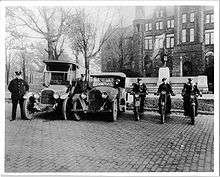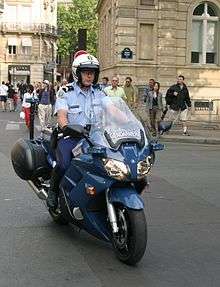Police motorcycle
A police motorcycle is a motorcycle used by various police departments. They may be custom designed to meet the requirements unique of a particular use. A police motorcycle is often called a "motor" by police officers in the United States. Similarly, motorcycle units are known as "motor units" and motorcycle officers are known as motor officers.
The maneuverability of the motorcycle on crowded streets offer advantages not provided by larger, more traditional police vehicles. The motorcycle's relatively small size allows it to get to accident scenes more quickly when incidents such as traffic collisions slow down access by four-wheel vehicles. Police motorcycles are also used in police funerals, VIP motorcades, and other special events.
History

Police officers have used motorcycles—primarily for the enforcement of traffic laws and as escort vehicles—since the early 20th century. Chief August Vollmer of the Berkeley Police Department is credited with organizing the first official police motorcycle patrol in the United States in 1911.[1] However, several police forces around the country reported using motorcycles as patrol vehicles earlier. Harley-Davidson credits Detroit, Michigan as being the first purchaser of police motorcycles in 1908.[2] The police department in Evanston, Illinois also purchased a belt-driven motorcycle for its first motorcycle police officer in 1908,[3] and the Portland, Oregon Police Bureau had a police officer who used his personal motorcycle to patrol the city as early as 1909.[4]
The role of the motorcycle as inexpensive public transportation evolved in the 1930s, and their use by police and the armed forces also grew, providing a stable production market for the more utilitarian machines, especially as Europe rearmed after World War I.[5]
Motorcycles used

As of 2004 police departments in the United States typically use purpose-built motorcycles marketed by Harley-Davidson, Kawasaki, or BMW Motorrad.[6] Kawasaki police motorcycles, which were built for the US market in Lincoln, Nebraska, ceased production in September 2005. However, the Kawasaki Concours 14 is being modified and marketed for police use in some markets.
In Germany, BMW Motorrad is the largest provider of motorcycles for authority use.
In the United Kingdom, the most common police motorcycles are the BMW R1200RT-P and the Yamaha FJR1300. UK police forces have withdrawn the Honda ST1300 Pan-European since the death of an officer was blamed on the machine.[7] Some police forces also use scooters within towns for parking enforcement, or special-purpose machines such as unmarked (covert),[8] or off-road motorcycles.[9]
Of the British manufacturers themselves, Triumph motorcycles, built at Meriden, were used by many British (including the Metropolitan Police) and Commonwealth police forces until 1983 when the factory closed.[10] From the late 1940s, Triumph was also, for a time, the choice of the Parisian police, a fact promoted in a factory-produced movie, It's A Triumph !. The police version of the 650cc 6T Triumph Thunderbird was nicknamed the SAINT, an acronym of "Stops Anything In No Time".[11] By the mid-1970s, with industrial problems and closures affecting their spares supply and service, Triumphs and other British marques were increasingly replaced by the smoother BMW R80 (and to a more limited extent, Norton Interpols) than by then-current Triumph police bikes.[12] In an attempt to win back orders from BMW, Meriden marketed Triumph Bonneville and Tiger models of 750cc size with anti-vibration mountings as well as electric starting but these still only achieved limited sales success. In 1981, the UK newspaper, Motor Cycle News, reported Derbyshire's Chief Constable comparing these Triumphs very unfavorably to BMW, in particular, its anti-vibration engine mounts. Supported by an article in rival publication, Motor Cycle Weekly,[13] this criticism was strongly refuted by the factory and Derbyshire eventually accepted evaluation of police versions of the new Triumph T140W TSS in anti-vibration mounts.[14] Norton's Commando Interpol [12] and later Wankel rotary engine Interpol 2 motorcycle were used by some British forces until that firm's collapse in the early 1990s. Other marques such as BSA were used by some forces although only the Velocette LE 'noddy-bike' model proved as popular with the police as the Triumphs.

In 2008, BMW claimed to be the largest seller of motorcycles for authority use, as more than 100,000 BMW motorcycles were in official use in over 150 countries on five continents. In 2007, BMW sold 4,284 police motorcycles worldwide.[15] BMW produces factory built police-specific models such as the R1200RT-P and R900RT-P. More than 225 U.S. law enforcement agencies, including the California Highway Patrol, have BMW authority motorcycles in their fleets of patrol vehicles.[16] The new BMW bikes outperformed the aging Harley-Davidson fleet.[17]
Harley-Davidson has maintained a long relationship with police departments and law-enforcement agencies in some countries.[18] For the 2009 model year, Harley-Davidson offers the Harley-Davidson FLHTP Electra Glide, the FLHP Road King, the XL883 Sportster and the new XB12XP Buell Ulysses Police motorcycle.[2] The FLHTP Electra Glide and the FLHP Road King are also offered as Fire/Rescue motorcycles.
The LAPD drew nationwide attention in June 2014 when they added the Zero Motorcycles MMX stealth electric motorcycle to its fleet. The motorcycle was praised over the traditional bulky Harley-Davidson and BMW bikes for its stealth, low operational costs, immediate tactical advantage, and green environmental impact. [19]

- A police motorcycle of the Baden-Württemberg Police of the German State Police
 Police motorcyclists guarding a street skating convoy
Police motorcyclists guarding a street skating convoy UK police 1966 Triumph 6T Thunderbird SAINT model at the London Motorcycle Museum.
UK police 1966 Triumph 6T Thunderbird SAINT model at the London Motorcycle Museum. French gendarme on a Yamaha FJR1300 in Paris
French gendarme on a Yamaha FJR1300 in Paris Police Off-Road Motorcycle (Dirt Bike) units
Police Off-Road Motorcycle (Dirt Bike) units
See also
- Fire bike
- Motorcycle ambulance
- Motorcycle training
- Electra Glide in Blue, 1973 film starring Robert Blake as a motorcycle police officer
- CHiPs, 1977–1983 US TV series about motorcycle police officers
- Magnum Force, 1973 film starring Clint Eastwood as Dirty Harry and renegade motorcycle police officers
References
- ↑ "Our History". Berkeley Police Department Online, City of Berkeley, CA. Retrieved 2007-06-16.
- 1 2 "Harely-Davidson 2009 Police Motorcycles" (PDF). Harley-Davidson. Retrieved 2008-09-21.
- ↑ "Evanston Police Department History". City of Evanston, IL (2007). Archived from the original on 2007-06-07. Retrieved 2007-06-16.
- ↑ Officer Peter Bowman. "History of the Motorcycle Detail". Traffic Division, Portland Police Bureau, Portland, OR (1983, edited in 1999 by Officer Michael Clary). Retrieved 2007-06-16.
- ↑ Ian Chadwick (2001-06-30). "An overview of the British motorcycle industry and its collapse". British Motorcycle Manufacturers. Retrieved 2007-06-16.
- ↑ Kariya, Mark (February 2004). "Working on two wheels". Police Magazine. Retrieved 2013-04-14.
- ↑ "Police withdraw Pan over safety concerns". Motorcycle News. 2007-05-14. Retrieved 2007-12-26.
- ↑ "Unmarked patrols targets drivers". BBC News. 2007-10-31. Retrieved 2008-09-21.
- ↑ "Chief Constable's Electronic Newsletter" (PDF). Lothian and Borders Police. July 2007. p. 15. Retrieved 2008-09-21.
- ↑ "Photography project looks back at West Midlands Police motorbikes". BBC News. 2012-03-08.
- ↑ Clew, Jeff (2007). Edward Turner: The Man Behind the Motorcycles. Veloce Publishing Ltd. p. 57. ISBN 1-84584-065-8.
- 1 2 A Million Miles Ago by Neale Shilton (Haynes Foulis 1982) ISBN 0-85429-313-2
- ↑ Currie, Bob Bonnie Beats The Rap ! Motor Cycle Weekly 6 Feb 1982
- ↑ Rosamond, John Save The Triumph Bonneville ! The Inside Story of the Meriden Workers' Co-Op (Veloce 2009)
- ↑ "BMW Motorrad presents authority motorcycles at GPEC in Munich". BMW Motorrad USA. 2008-06-16. Archived from the original on 2008-08-03. Retrieved 2008-09-21.
- ↑ About Police Motorcycles
- ↑ Jackie L. Larson (21 July 2011). "Police replacing Crown Victorias". Edmonton Sun.
- ↑ "On Patrol" (PDF). 2005 Harley-Davidson Police Motorcycles. Archived from the original (PDF) on 2007-09-27. Retrieved 2007-06-18.
- ↑ Nancy Dillon (20 June 2014). "LAPD now using new Zero MMX stealth electric motorcycle". NEW YORK DAILY NEWS.
External links
- Motorcycle Patrol TELEMASP Bulletin, Texas Law Enforcement Management and Administrative Statistics Program
| Wikimedia Commons has media related to Police motorcycles. |
